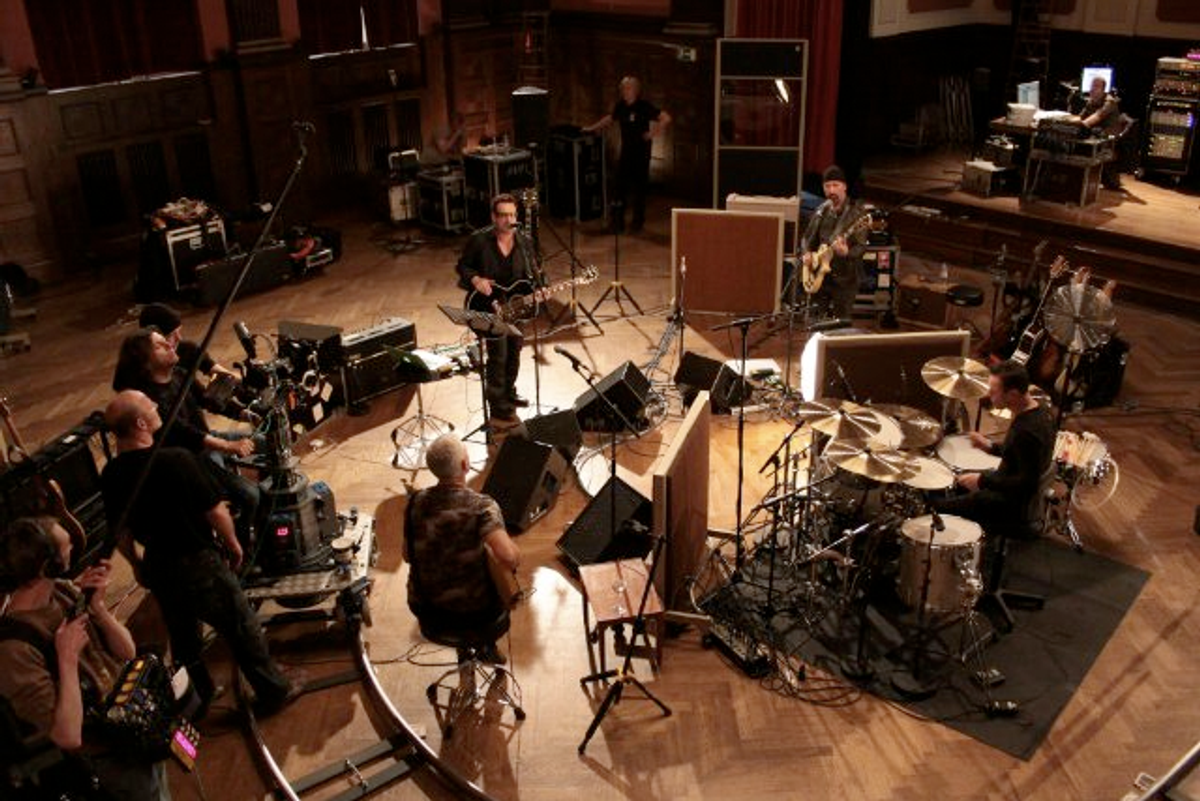In Davis Guggenheim's documentary "From the Sky Down," you'll see the singer of the world's biggest band glowering and sniping at a cameraman, worrying with his bandmates about persistent screw-ups in shows and swearing about a stage crew's incompetence as a worried-looking stylist helps him dress before an encore.
Guggenheim resurrected this footage from discarded dailies for "Rattle and Hum," Phil Joanou's hagiographic 1989 film about U2's Joshua Tree tour and band members' "discovery" of American soul and blues music. Had such scenes been included in that film, they'd have drawn out the tension within the band and helped to humanize them; instead, U2 members were pilloried in the press for their self-importance. They'd hit a snag on their nonstop road to massive success, and they needed to rethink their music, their image and what kind of band they wanted to be.
In "From the Sky Down" -- making the film-festival rounds before airing on Showtime next month -- Guggenheim (best known for helming the global-warming doc "An Inconvenient Truth") gets the intimate story of insecurity and emotional intensity that "Rattle and Hum" couldn't portray. And he shows the aftermath, when the four "earnest, po-faced men" (as bassist Adam Clayton describes his band in the film) became cheekier, rhythmically savvier and even somewhat cool.
Having previously worked with The Edge on the rock-guitar documentary "It Might Get Loud," Guggenheim was summoned by U2 to tell the story behind the band's 1991 album "Achtung Baby" as members prepared to play its songs on tour this summer. When conducting research in their Dublin archives, he found the "Rattle and Hum" footage, which he calls "revelatory." Over the phone from his L.A. office, the director waxes rhapsodic: "You fall on your knees looking at this stuff -- it's so rare and beautiful. I spend a lot of time saying 'no' to possible movies, but this is an incredible story."
To tell it, however, presented a challenge: "People know the songs too well, and they know the band too well. How do you get to know these people in a different way? How do you hear these songs in a different way?"
Bono has often gone on record with bon mots about U2's history, including his characterization of "Achtung Baby" as "the sound of four men cutting down the Joshua tree" -- a phrase he repeats in "From the Sky Down." What's more, much has already been made of how the band, casting around for a sound that would marry Bono and The Edge's newfound love of electronic music with drummer Larry Mullen's insistence on song structure, created the song "One" out of a jam session for "Mysterious Ways." Guggenheim adds something new by actually finding the studio tapes of this session and playing them back to the singer and guitarist, whom he reconvenes in Berlin's Hansa Studios, where they recorded it. Both men smirk at the gaucheness of the early versions, but then their faces light up.
"One," an emotional ballad with dark textures and ambiguous lyrics, was a watershed song for U2. Guggenheim shows how it emerged in the studio with archival footage, reminiscences from the band and illustrative animation; it's rare even for a music documentary to delve this deeply into the process of creation. By focusing on the song that helped the band find what Clayton calls its new sonic and "spiritual" identity, the director finds his film's center, delivering much more than a mere "Behind the Music"-type tell-all.
That said, he also draws out elements of tension, both old and new. In one hushed moment, captured during rehearsals this May in Winnipeg, The Edge plays a solo version of "Achtung Baby's" closer, "Love Is Blindness," on acoustic guitar, while reflecting in an overdubbed interview on how the breakup of his marriage affected his work on the album. When U2 rehearses together, Bono orders his bandmates around, and The Edge growls back at him.
"Maybe the bands that are less interesting are the ones that have agreed to agree," Guggenheim muses. "One of the questions the story asks is, 'How did these guys stay together and still be creative and vital?' Every other rock band has either imploded or exploded or stayed together out of some sort of painful agreement to get along regardless."
One gets the impression Guggenheim is somewhat in awe of his subjects -- when asked whether he stage-managed the film's run-through of "One" with the band sitting in a circle, he says, "God forbid that I'd tell them where to stand." Operating within the clear boundaries of U2's commission, the movie doesn't address the one pertinent question its very existence seems to raise: What impact might revisiting such a fertile period of creativity have on the band now? Guggenheim offers only that "The're still writing songs; they're still pushing each other."
In the wake of "Achtung Baby," U2 became increasingly ironic, electronic, over-the-top in its presentation, but after the lukewarm reception of 1997's "Pop," members switched gears again, reconstructing the idea of the rock band that they claimed to have deconstructed. Their latest album, 2009's "No Line on the Horizon," was met with a relatively muted reception. Perhaps it's no coincidence that on the third leg of their 360° Tour, this summer, they rejigged the playlist to focus more on their early-'90s work.
At the very least, from this film, we know that they're still preoccupied with their creative process. And maybe the U2 of 2011, though more affable on-camera than they were 20 years ago, might look back at "Achtung Baby" and find themselves inspired.
"The film is remarkably intimate and honest and truthful about [U2] at that time," says Guggenheim. "I don't think I know a movie in recent memory where rock stars have been so open, so that's exciting ... It feels like one fantastic chapter in an epic story."



Shares